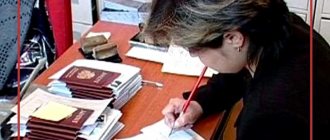Every person living on the territory of the Russian Federation is obliged to adhere to the rules of registration on a permanent or temporary basis. The first option involves registration at the place of permanent residence, the second - at the address of temporary residence. If a family is raising a child in a legal marriage, the family’s intention to have a common registration address seems logical, but everything changes when the parents divorce. Whether a mother can live at the place of registration of a minor child is determined taking into account the current rules, implying the consent of the property owner or the main employer.
Registration records help track the implementation of social programs and assess the economic and demographic indicators of the region. The obligation of registration, according to RF PP No. 713 of July 17, 1995, applies to all age groups, regardless of the legal capacity and other characteristics of citizens. A minor child must live with his or her legal representative, who is the mother or father. If the mother is not deprived of her rights and is responsible for the ward, it is assumed that the relatives should live together. The situation is more complicated if the mother does not own her own apartment and is not registered anywhere.
Who should the children live with?
A person’s place of residence is determined in Article 20 of the Civil Code of the Russian Federation.
For a child under fourteen years of age, the principle of so-called cohabitation applies. That is, such persons must be registered together with their legal representatives - parents or guardians. A child over fourteen years old can live separately. In this case, the consent of both legal representatives is required to register the child at a specific address. An exception in this case is the deprivation of the rights of one of the parents or guardians. In such a situation, the consent of the representative who retains all possibilities will be sufficient.
Do schools check registration
Photo by Pexels
When entering school, the administration of the educational institution will definitely ask about registration. To prioritize your child's enrollment. In the future, the data can be double-checked: both by the school itself on its own initiative, and in the form of a response to an appeal. For example, if you receive a complaint from other parents whose children were left “out of work” and were not enrolled in school .
If during the inspection it turns out that the registration was fictitious, you will have to pay a fine, and the child may be expelled due to a violation of the school enrollment procedure.
Thus, registration will be needed not for one day, but most likely for the entire duration of study. You cannot be discharged immediately after admission. There will be consequences.
Place of residence of the child after divorce
After the annulment of the marriage, it is necessary to determine the place of residence of the child. This can be solved in several ways.
First of all, the ex-husband and wife can agree peacefully. Such a decision must be documented. To do this, you need to provide written consent.
Such a document is most often drawn up in the following cases:
- The marriage was not registered and one of the parents wants to avoid communication problems with the child in the future.
- The legal representative does not claim to live together, but intends to take part in raising the child.
- The parent wants to clearly define the routine for communicating with the baby.
There is no standard format for this document established by current regulations.
The text of the agreement must include the following information:
- Date and place of document preparation.
- Information about the parties to the agreement - last name, first name, patronymic of each, date of birth, number and series of passports, residential addresses.
- Rights and responsibilities of both parents. Here you can provide information about the institution where the baby will study, as well as agree on the time and place of meetings with the father or mother.
- Responsibility of the parties.
- Grounds for cancellation of the agreement.
- Date of registration.
- Details and signatures.
The agreement is certified by a signature of a notary and his seal.
Disputes between parents
The current legislation determines that a dispute arising between parents can be resolved peacefully or in court. Disagreements between former spouses are most often caused not only by personal hostility, but also by everyday reasons. There are often cases when, after a divorce, people live not just in different houses, but also in different settlements. The remoteness of the actual location may make it difficult for one of the former spouses to communicate with the baby. In such situations, everyone tries to keep the child with themselves.
It should be noted that the mother and father have equal rights in this case. However, the child's opinion is also taken into account.
Determination of place of residence through the court
If the former spouses have not reached an amicable agreement, each of them can file a claim in court. It should be noted that in most cases the issue of the child’s place of residence is resolved during the annulment process. Although a claim of this nature can be considered in a separate meeting.
To satisfy his claim, the initiator must send a statement of claim to the court.
The text of the document must indicate the following:
- The name and address of the court to which the claim is being sent.
- Information about the initiator. Here you should indicate your full last name, first name, patronymic, passport details, and contact phone number. The claim must contain similar information about the defendant.
- All circumstances of marriage and annulment - date, place, reasons.
- Justification of the reasons why the child should live with the plaintiff.
- Specifying the address.
- The request itself to determine the place of residence.
- List of attached documentation.
- Date of filing the claim and signature of the initiator.
The application must be accompanied by the child’s birth certificate, a receipt for payment of the state duty, a copy of the statement of claim for the defendant, a document on the availability of residential premises, characterizing materials from the place of work.
This information must be submitted to the court. The initiator can do this in person, by mail or through a proxy. After receiving the documents, a date, time and place for consideration of the claim will be set. Interested parties are notified of this by mail or by sending mobile messages.
On the appointed day, the plaintiff, defendant or their representatives must appear at the hearing or report the reasons for their absence. During the proceedings, all submitted documents are examined and both parties, as well as witnesses, are interviewed. After this, a conclusion is made. When making decisions, the child’s opinion is also taken into account.
The court decision indicates the specific address where the baby will live. Copies of the conclusion are handed over to the parties after it comes into force.
Sample claim to determine the place of residence of a child
- Look
Is it possible to register a child in another city and how to do it?
The registration process itself involves preparing the necessary documents and submitting them to the registration authority at the place where the child will actually live. Parents need to remember that it is much easier to register a child under the age of 14 than to then re-register a child at a different address.
For registration, you will need to submit the same documents, but now a new certificate of ownership, issued for the child and/or parents, and a certificate of departure, which was issued upon discharge. You will also have to submit a marriage or divorce certificate. If the child is registered in a room with one of them, then additionally the permission of the second parent.
Can the mother live at the child’s place of registration?
Residence of the mother at the place of registration of a minor child is possible subject to the consent of the employer or owner. The exception in this case is the fact of deprivation of her parental rights. Another significant factor is the status of housing. It should be noted that current legislation stipulates that every resident must be registered.
The problem is eliminated if the issue is related to the mother’s personal apartment in which the child is registered. If the housing is owned by a woman, but she is not registered there, then the consent of other persons is not required, she can freely live with her baby.
In a municipal apartment
To register in a municipal apartment with a baby, the mother will need the consent of the tenant, as well as other residents, including those who are absent temporarily. It should be noted that the responsible tenant may refuse to live if, after registration, the minimum size of space per person decreases. If the child has not reached the age of 14, registration without parents will be completely impossible.
Sample consent for registration in a municipal apartment
In a privatized apartment
To live and register in private housing, the consent of the owner will be required. In this case, the age of the child also plays a role. If he is under fourteen, then he will not be able to register without his parents or one of them initially. When the matter involves a child over a specified age, the owner's consent will be required. In this case, the owner makes the decision alone. It is impossible to oblige him to give a positive answer.
Municipal housing
If the housing belongs to the municipality, and citizens live in the apartment under a social tenancy agreement, according to Article 70 of the Housing Code of the Russian Federation, you will have to obtain consent:
- Responsible tenant.
- Every resident.
- Registered but temporarily absent persons.
If the number of meters in the apartment is less than required by the standards, 1 more person may be refused admission to the apartment, since the family will need to improve their living conditions. The consent of residents for registration is drawn up in writing according to the sample.
Important! A citizen under the age of 14 will not be registered in a municipal apartment if the parents decide to arrange separate residence for the ward without a mother or father.
Rules for moving into an apartment
The mother's move-in takes place on a general basis.
In order to live at the place where the child is registered, you must register yourself. Otherwise, administrative measures provided for in Article 19.15.1 of the Code of Administrative Offenses of the Russian Federation may be applied to the person.
First, you need to draw up an application in the form approved by Order of the Ministry of Internal Affairs of Russia dated December 31, 2021 No. 984 “On approval of the Administrative Regulations of the Ministry of Internal Affairs of the Russian Federation for the provision of public services for registration of citizens.” You will also need to present your passport and documents giving the right to move in. The latter may be a lease agreement, the consent of the owner or tenant.
After submitting all the specified documents, the mother will be able to live at the place of registration with the child. Registration will be carried out within three days.
Registration in another city: what you need to know
The rights for permanent and temporary registration are the same. The only difference is its validity period. Temporary registration is limited, its maximum validity is three years. When registering permanently, a stamp is affixed to the passport. Temporary registration requires a certificate.
Registration is possible only upon presentation of title documents by the property owners. If the owner of a property moves to another city with relatives, then additional documents certifying their relationship and photocopies of papers will be required. In accordance with the law, only spouses, children and their parents are recognized as close relatives. Suitable documents are: marriage certificate or birth certificates of children.
Sample documents
Sample consent for registration in a municipal apartment
Sample consent of the owner for registration at the place of residence
- Look
Sample owner's consent for registration at the place of residence
- Look
Sample agreement on determining the child’s place of residence
- Look
Sample application for registration at place of residence
Sample application for registration at the place of stay
- Look
Sample claim to determine the place of residence of a child
- Look







